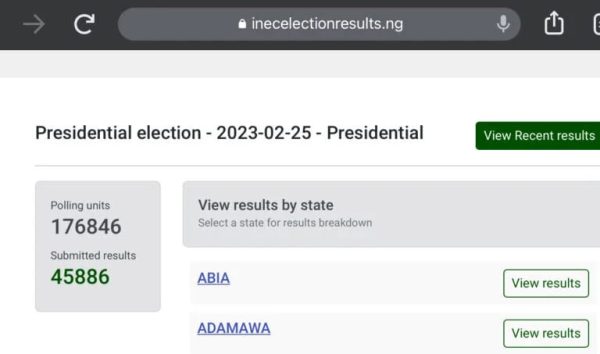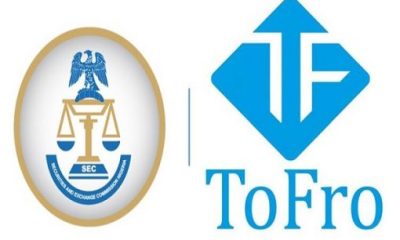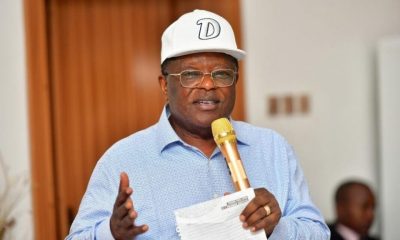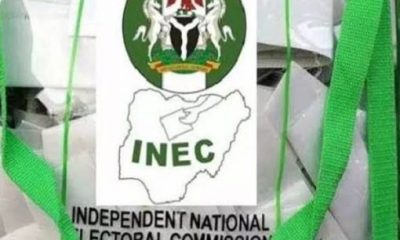News
‘HTTP had server error’ — INEC finally opens up IReV failure during presidential poll
The Independent National Electoral Commission (INEC) has finally released a comprehensive post-mortem on the 2023 general election.
The report, released on the first anniversary of the election, documents the failure of the result viewing portal (IReV) during the presidential poll.
The commission, in the report seen by newsmen, said the server returned “HTTP error” because of a configuration bug which was discovered after the presiding officers at the polling units could only upload the results of the national assembly elections.
“In configuring and mapping the election results for the presidential and NASS elections,” the report reads, “the Commission created Four Hundred and Seventy (470) election types consisting of one presidential constituency covering the entire country, 109 Senatorial Districts and 360 Federal Constituencies.
“Each Senatorial District and Federal Constituency election on the database was mapped to their respective States. However, the presidential election result is a single, countrywide constituency and therefore, does not belong to any one State.
“Consequently, while the uploads for the NASS elections succeeded as the application was able to identify the respective State and build the folder hierarchy for the results organization process for the election, attempts to upload the presidential election results sheets, which does not belong to or mapped to any State on the database, failed.
“Instead, it returned a HTTP server error response. This failure is attributable to the inability of the application to create and build a folder structure to organize the uploaded images of the result sheets of the presidential election.”
IReV, which was first used by INEC during the Nasarawa central constituency bye-election in August 2020, was designed for the uploading of result sheets from polling units on election day so that the public could view them in real-time.
This, according to the commission, is to promote transparency — a development that also allows members of the public to tally the scores themselves while awaiting the official results.
However, while most of the results of the legislative elections held on February 25, 2023 were uploaded to IReV, those of the presidential poll held the same day were not on the portal until late at night and only a few were available.
It took nearly a week for a substantial number of the presidential election result sheets from the 176,849 polling units to be uploaded, by which time opposition figures had started alleging manipulation of the votes.
Also, the results eventually posted on IReV were analysed by several media and civil society organisations with a conclusion that the votes for Bola Tinubu, the candidate of the All Progressives Congress (APC), were inflated in Rivers state while those of Peter Obi, candidate of the Labour Party (LP), were reduced.
Tinubu was credited with 231,591 votes while Obi had 175,071 votes in the official results.
However, the results posted on IReV appeared to show that Obi won Rivers with about 100,000 votes — although not significant enough to upturn the national gap of over two million votes between him and Tinubu, the overall winner.

There was no other state where major discrepancies were spotted on IReV.
In its report, INEC narrated how the problem was first reported at 4pm on election day and how it was partially resolved in four hours.
The Independent National Electoral Commission (INEC) has finally released a comprehensive post-mortem on the 2023 general election.
The report, released on the first anniversary of the election, documents the failure of the result viewing portal (IReV) during the presidential poll.
The commission, in the report seen by newsmen, said the server returned “HTTP error” because of a configuration bug which was discovered after the presiding officers at the polling units could only upload the results of the national assembly elections.
“In configuring and mapping the election results for the presidential and NASS elections,” the report reads, “the Commission created Four Hundred and Seventy (470) election types consisting of one presidential constituency covering the entire country, 109 Senatorial Districts and 360 Federal Constituencies.
“Each Senatorial District and Federal Constituency election on the database was mapped to their respective States. However, the presidential election result is a single, countrywide constituency and therefore, does not belong to any one State.
“Consequently, while the uploads for the NASS elections succeeded as the application was able to identify the respective State and build the folder hierarchy for the results organization process for the election, attempts to upload the presidential election results sheets, which does not belong to or mapped to any State on the database, failed.
“Instead, it returned a HTTP server error response. This failure is attributable to the inability of the application to create and build a folder structure to organize the uploaded images of the result sheets of the presidential election.”
It took weeks for the presidential results to be uploaded to IReV
IReV, which was first used by INEC during the Nasarawa central constituency bye-election in August 2020, was designed for the uploading of result sheets from polling units on election day so that the public could view them in real-time.
This, according to the commission, is to promote transparency — a development that also allows members of the public to tally the scores themselves while awaiting the official results.
However, while most of the results of the legislative elections held on February 25, 2023 were uploaded to IReV, those of the presidential poll held the same day were not on the portal until late at night and only a few were available.
It took nearly a week for a substantial number of the presidential election result sheets from the 176,849 polling units to be uploaded, by which time opposition figures had started alleging manipulation of the votes.
Also, the results eventually posted on IReV were analysed by several media and civil society organisations with a conclusion that the votes for Bola Tinubu, the candidate of the All Progressives Congress (APC), were inflated in Rivers state while those of Peter Obi, candidate of the Labour Party (LP), were reduced.
Tinubu was credited with 231,591 votes while Obi had 175,071 votes in the official results.
However, the results posted on IReV appeared to show that Obi won Rivers with about 100,000 votes — although not significant enough to upturn the national gap of over two million votes between him and Tinubu, the overall winner.
There was no other state where major discrepancies were spotted on IReV.
‘PROBLEM WAS SOLVED SAME DAY’
Rivers results on IReV appear to show Obi’s votes were understated in the official tally announced. There were no major discrepancies recorded elsewhere
In its report, INEC narrated how the problem was first reported at 4pm on election day and how it was partially resolved in four hours.
The commission admitted that it was a key challenge that “impacted on the public perception” of the election and elicited “widespread commentary across the country”.
“To begin with, it is important to note that the IReV portal is one of the most significant innovations introduced by the Commission prior to the 2023 General Election to promote the integrity and transparency of the electoral process. As a public-facing website, the IReV portal shows the images of the original Polling Unit result sheets as recorded in Form EC8A,” INEC said.
“The operational methodology and the concept behind the upload of results to the IReV for public viewing is quite simple. At the end of polls, Polling Unit results (Form EC8As) are scanned and uploaded to the IReV by the Presiding Officer(s). These results are then available for viewing to the public and all stakeholders.
“The system, which was first deployed during Nasarawa Central State Constituency bye-election in August 2020 and tested in 105 subsequent elections, including three (3) off-cycle governorship elections, has tremendously improved public confidence in the integrity and transparency of the Commission’s result management process.
“The challenge of uploading the PU presidential election results on the IReV after the presidential and NASS elections on 25th February 2023 was unique. As voting ended across the country and POs began the process of uploading the images of the PU result sheets of the elections for the various constituencies around 4:00pm, the Commission began to receive reports that attempts to upload presidential election result sheets was failing.
“Following these reports, the Commission immediately engaged with its field officials for details in order to understand, and trace the origin, source, scale and magnitude of the problem across the result management ecosystem to devise appropriate solutions.
“In the troubleshooting process, it was established that there was no issue in uploading the PU result sheets of the Senate and House of Representatives elections through the Election Result Modules. However, there was a problem with uploading the presidential election results to the system.
“Attempts to upload the results were generating internal server errors, which refer to a significant impairment that usually originate from within an application due to problems relating to configuration, permissions, or failure to create or access application resources correctly.
“Further interrogation of the Election Result Modules indicated that the system is encountering an unexpected configuration problem in mapping the presidential election results uploaded into the system to the participating Polling Units.
“Due to the complex, sensitive and critical nature of the systems and the real potential for malicious cyberattacks, the Commission immediately put in place several strict security and audit control measures to prevent any unfettered or elevated access to the Result Upload System.”
The commission said after identifying the source of the problem, it quickly created and deployed “hotfixes” — software updates for fixing a bug or any vulnerabilities in a system.
The deployed hotfixes eventually resolved the HTTP error on the system “and the first presidential election result sheet was successfully uploaded at 8.55pm on the 25th of February 2023,” it said.
After the deployment of hotfixes to rectify the upload challenges, the commission said it “noticed a high volume of uploads on the queue”.
“All results that scanned but could not be uploaded due to the error were queued waiting to be automatically processed,” the report states.
“Due to the large volume and high traffic from the queue, the system was running slower, even though it tried to scale up automatically to handle the unanticipated heavy traffic. The density of the traffic that slowed the uploads was one issue.
“Another was that the offline queue requires the BVAS devices to be switched-on and connected to the internet for the upload. However, some of the POs had at the time left their PUs, and the devices had either been switched-off, or were out of internet coverage. Switched-off devices could not connect and upload the results sheets.
“The Commission had to reach out to the POs of affected areas to switch-on their systems and ensure internet connectivity for the uploads to continue. This accounted for the delay, with some of the results coming in the next day.
“By and large, the glitch experienced in uploading the scanned images of PU presidential election result sheets on 25th February 2023 was due to the inherent complexity within the System, which was difficult to anticipate and mitigate.”
The electoral commission said it has made improvements to the IReV and “taken additional steps to build more resilience and undertook additional checks to ensure the stability and optimal operation and performance of the IReV portal”.
According to the report, “quality assurance checks are now done to complement the end-to-end testing of the entire result upload ecosystem before the conduct of any election”.
The challenges notwithstanding, INEC scored itself high on its performance, maintaining that “there is no perfect election anywhere in the world”.
“Public commentaries have dwelled largely on the challenges of the election,” the report further reads. “Yet, the 2023 General Election produced the most diverse outcome in recent Nigerian electoral history in terms of party representation in executive and legislative elections nationwide. Thus, four (4) political parties produced State Governors, seven (7) secured Senatorial seats, eight (8) won federal constituencies and nine (9) in State seats,” the report said.
“A granular analysis of the results and performance of the leading parties across the country affirms this diversity. The performance of the four (4) leading political parties – APC, LP, PDP and NNPP – in the presidential election across the 6 geopolitical zones in respect of the required 25% threshold to win a state in a presidential election.
“Clearly, across the zones, the performance of the four (4) leading parties shows the diversity and subtlety in the results, attesting to the integrity of both the process and outcome.
“Thus, in the North Central Zone, the APC won 38.58% of the presidential vote, followed by LP with 31.01% and PDP with 25.46%. In the North-East, the PDP won 50.67% of the presidential vote, followed by the APC with 29.16%, and LP with 6.09%.
“In the North-West, the APC won 39.54, followed by the PDP with 34.87%, and LP with 4.08%. In the South-East, LP led with 87.79%, with the APC having 5.71% and the PDP 4.08%.
“Similarly, LP led in the South-South with 42.37%, followed by the APC with 27.99% and the PDP with 26.12%. In the South-West, the APC led with 53.59% followed by the PDP with 22.14% and the LP with 19.97%.”























